#i think its mostly a narrative thing to the audience
Explore tagged Tumblr posts
Note
why do you think dennis doesn't pursue any women in season 16? it's a huge contrast to how he is in previous seasons so it must be a deliberate writing choice & i've been dying to hear detailed theories about this
Every season for the past, well I don't even know how long, has always had some kind of 'Dennis pursuing women' narrative written in, for sure, but I think it's maybe less of a Dennis x Women plot, and more of a hard-scene reminder that this guy is a freak, he plays games, he is a sexual predator (and he's fucked up).
Take the last couple seasons: 13, Escapes; 14, Gets Romantic; 15, LW7; 16...Frank vs. Russia. These plots for Dennis are continuing to establish and reaffirm that this guy is in the 'dating' game for the hunt, to evolve and beat any challenge that presents itself. Sex is a game he needs to win at, and he continues to find new ways to approach that. We aren't seeing this side of Dennis' life so we know he's into women or that he has sex, we're seeing it because we're continuing to learn and understand that he's always playing a game, working a narrative. He's not out there dating or having sex for a connection, he never has. He's getting something else out of it.
I'm not sure I really have a theory, or even need to dig more than surface level here. I think Frank Vs. Russia is that same plot that you might say was 'missing' this season. It's the same thing, just men.
In Escapes we only learn Dennis has a sex escape room because Dee gets caught up in it, but he's been doing this. We were none-the-wiser, because Dennis' sex life only rears its head to the Gang when the narrative calls for it. I see Frank vs. Russia as very similar (and same writer, look at that). We learn about The S.I.N.N.E.D. System because Dennis revealed it to Dee and Mac to get them off his back, but he's been doing this. It's the same narrative we've seen for years, really truly: Dennis pursues women people in creepy (or freaky) ways because sex is a game he needs to play in order to win.
Why don't we see him pursue any women in Season 16? Well, we don't often get more than one Dennis sex plot, but I genuinely think having this as the stand-alone sex (in the butt) plot of the Season just better highlights the fact that Dennis "anyone can get a guy to bang them once" Reynolds plays for both teams, in equally messed up ways.
So, it's not a seasonally "Dennis pursues women" plot, but a seasonally "Dennis has a fucked up relationship with sex" narrative :)
#iasip#dennis reynolds#ask#does this make sense? lol#i think its mostly a narrative thing to the audience#we're telling you that frank vs russia IS dennis' “creepy sex plot” of the season#he bangs dudes *surprised pikachu*#but no i was actually surprised falling over that theyd make it so clear but no i wasnt but yes i was but it was mganz so#yay#sunny 16#frank vs russia
41 notes
·
View notes
Text
so when the mighty nein participate in a premeditated, treasonous act against the governance in their nation and exonerate themselves by framing innocents for the crime, they are lauded as underground heroes, but when I, essek thelyss-
#thinner than a razor indeed xD#nein again#the following ramble is all mostly a watsonian/in-universe pov ->#thinking about the gentleman clearing the nein's names after ulog assassinated high-richter prucine#aka one of the highest up in the second largest city in the empire#it even made its way into crit recap animated xD#this is to say essek framing someone to dodge 'lawful' consequence is not too unfamiliar a concept to the nein#the nein (and thus we the audience) just have the benefit of humanizing specifically adeen because we know his name and face#he is for all narrative intents and purposes a character rather than a footnote#and though we can get into philosophical discussions of moral relativism and the pros and cons of punitive vs restorative justice and such#i'm not going to bother splitting hairs here over intentions or crime severity because the consequence is the same for those framed#according to egtw in both the empire and the dynasty the punishment for treason is death#chanse chatters#though! who knows if adeen is dead#maybe he made a deal with the empire/ludinus for his life#.......... imagine if adeen had shown up in c3 as a big bad general xD#i need to stop before that thought runs away from me i have things to do xD#also where's vence#is he still alive#okay i'm done xD
87 notes
·
View notes
Text
maybe my least favorite anti-autistic stereotype is the trope that autistic people are ultra-rational and thus chock full of bigotry. like house m.d does this*, bones does this, i'm pretty sure the good doctor also did this with their trans episode. allistic showrunners looovee writing an autistic character who says blatantly racist, sexist, ableist, etc. things & justifies it by saying that autistics are simply too Rational and Incapable Of Understanding Emotion to pretend that our current social hierarchies aren't natural!
it sucks for one because it promotes the stereotype that all autistics are hypoempathetic, AND that being hypoempathetic means that you uncritically believe bigotry. but it ALSO sucks because it also promotes the idea that bigotry is driven by rationality and being anti-bigotry is driven by irrational emotions. and that the fight for social justice is really about making people set aside their rational bigoted beliefs because its mean. rather than making arguments based on the actual material evidence of oppression, and how the logic of oppression is deeply flawed and often extremely contradictory because it's only goal is maintaining power. and how that is in fact morally wrong.
my examples are mostly TV but i was thinking about this while rewatching munecat's video debunking evopsych (around 2:47:06). in which an evopsych guy is justifying a misogynistic paper arguing that women are less inclined towards STEM because Evolution, by saying that the author is "Aspy" and thus ~too rational to tone himself down for The Woke~. It's such bullshit and it hides behind aspie supremacy and fantastical ideas of autistic people as robots instead of human beings filled with biases and fallacies and yes, EMOTIONS, in order to push the narrative that bigotry is rational and the left is motivated by our squishy soft womanly irrational empathy rather than the fact that systemic racism objectively exists and misogyny is a self-contradictory mess.
also it's just a way of avoiding the reality of their own bigotry. if misogyny isn't scientifically valid, then that means they must choose to hold misogynistic beliefs, rather then those beliefs being natural. which means they have to actually grapple with the question of whether or not it is moral to maintain a misogynistic system rather than deconstructing it and creating a more equal society. if misogyny is just Nature and Facts and Logic then they can pretend that it's all out of their hands! they want to side-step the question of whether or not its right by arguing making an appeal to evolution as some divine ruler which will destroy our society if we ever deviate from 1950s US social hierarchies.
*to give this show credit, it has other reasons why house is Like That, and he also has plenty of moments where he criticizes the status quo and/or the audience is meant to disagree with his behavior/views. but they still do engage in "house is bigoted and his bigotry is justified by the story" such as in the infamous asexuality episode. but the writers also refused to make him canonically autistic even when they wrote him Like That so who gives a fuck
628 notes
·
View notes
Text
Sorry wait I get it now: authors today want to write forbidden love so bad because it speaks to being so attracted to the other BUT many authors won't let their characters do anything morally untoward so any animosity comes off extremely watered down
People yearn to write modern "I can't or shouldn't be attracted to you but damn it all to hell I am I AM" romance but keep thinking that's what enemies to lovers is and labeling two like. twenty-somethings as "enemies"... Get real
#so the reason She hates Him is just bc he like... performs better than her at their job and is confident. or something#and He hates Her bc oh god shes just so attractive but she hates me so i cant have her and im Frustrated#as to the moral thing: unfortunately that's where a lot of audience criticism comes from these days#characters cant be morally complicated or dynamic bc its problematic or whatever#but entirely unproblematic ppl with no plot outside of romance are gonna be boring im so sorry#like fics get a pass bc theyre not always meant to be full narratives but whole novels should have. like. something for the plot#this is about e2l and forbidden love mostly tho i do think you can have interesting non problematic love interests in other genres#stickynotes.tpe
53 notes
·
View notes
Text
I think something really interesting about TMA vs TMP so far is the different use of suspense, which I actually think "the cake scenes" (as I've started to call them in my head) are really good shorthand for.
In TMA, we spend four seasons very slowly getting the hang of things alongside the protagonists. We take all of that time to slowly understand how the world works, how fucked up it is, and how fucked up it can get. The narrative waits until we have a deep understanding of that (although maybe not entirely complete yet), until the characters and world have hit a new, very deep low. Then it throws us back to the start. It gives us cake scene number one (Jon's birthday) and says "Hey remember how when this started they were all (mostly) happy and just regular people working a kinda weird job and they were all friends and had joy?" And it hurts! Because we know how bad it is now, so the sharp contrast to how it was before it all started hits hard!
TMA's suspense is built on the audience not understanding what's happening alongside the characters, so the depth of tragedy happening to them can only be understood in retrospect.
TMP doesnt rely on TMA entirely, but it's written with the understanding that the majority of its listeners will have listened to TMA. It knows that a lot of the audience may not know exactly what's going on here, but they know the general shape of the world and they know exactly how bad it can get (thanks MAG200).
Because it's writing for (mostly) that audience, TMP doesn't have to write about its tragedy only in retrospect. The suspense comes both from not knowing what's happening (like TMA) and from knowing exactly what's happening while the characters don't (whooo dramatic irony). The audience knows what the fears are and how they can effect the world--Sam and Alice don't.
So TMP's cake scene (Teddy's going away party) happens at the start. "Look at all these people being (mostly) happy and just regular people working a kinda weird job and all being friends and having joy! Doesn't it hurt knowing exactly how bad things could get for them?"
And it does. We are two episodes in and nothing has happened to Alice and Sam, but it's already very clear that we are audience to a tragedy. Even if they don't end up totally fucked, it's clear that their arcs will be tragic.
#the magnus protocol#the magnus archives#tmagp#tma#the magnus protocol spoilers#man im in deep already#you know its good when im writing essays three days after release#but ohhhhhh man we're in for it
1K notes
·
View notes
Text
Fixing MHA's Ending So It Follows Through With Its Core Themes (And It Basically Fixes Itself)
I don't like retconning at the best of times, but turning what started as essentially a Hope focused narrative into a "realistic" tragedy at the very last second is some wild work.
So I'm gonna do what I do best as a fic writer and fix it!!!!!
The Summary
So, I'm pretty sure all of us were on mostly the same page up until the very last panels of the Shigaraki fight (Having AFO being just "born evil" was probably the start of things not being great, but I'm willing to let that slide because it doesn't really effect the overall function of the story that much). Once that and the epilogue started is where I mostly saw people being like ????????? to a lot of choices, so I'm going to focus on those two sections only.
We're gonna be rewriting:
-The deaths of the Villains + Kurogiri (obvs)
-The overall post-War actions and reactions
-The continued existence of the Commission and the Hero Rankings
-Hawk's fate
-Spinner's fate
-A liiiiitle tweak to Chisaki's fate
-Slight tweaks to the Todorokis
-and finally What to DO with the Villains + Kurogiri now that they're alive
And we'll be starting with...
Toga
Now for a battle that was so beautiful, this really did end up completely falling apart.
I'm not gonna justify every single Villain Rescue I do, but Toga's really comes down to one simple reason for me:

Her bullies literally wanted her to die as atonement.
You don't...typically make your character's fate agree with their bullies or abusers (otherwise???? why are you explicitly portraying them as bullies and abusers to the audience if you want us to ultimately agree with them?????)
Throughout most of the story prior to this, Hori made it a staple in the show that dying for the cause, hurting yourself for the cause, martyring yourself or otherwise telling someone to kill themselves for the cause is a vile thing to do. So, it makes ZERO sense why he would suddenly retcon this at such a critical moment, especially since he already set the stage for it to be wrong in the first place.
(also does anyone also think it was weird/creepy that Hori LITERALLY has her do this with Twice and she very explicitly says "Don't be stupid I don't have to give all of my blood away"? No? Just me?)
Everything happens the same, she still thinks she's sacrificing herself, "If only, if only", blah blah blah
AND THEN...
Hawks
This is such low-hanging fruit plot-wise it actually feels offensive that it went nowhere
Nothing happens with Hawks. We all say it, fans and non-fans alike. He is wasted potential incarnate. His story is a circle and it so easily did not have to be that way because of one simple writing decision:
Hawks and Toga share a blood type.
Up until now, it really did seem like Hawks learned nothing from Jin's death. The first thing he says when he sees the clones is, "We have to kill them now!" But then, picture him still battered and broken from his fight with AFO, wingless, but there is still SOMETHING he can do to save someone's life.
And he puts the needle in his arm instead, and before she can question it, he tells her Jin would want her to live. He's not gonna make the same mistake twice.
(I also think it'd be nice if he said something like how lucky she is, to really go full circle with the Jin story, but I'm not trying dialogue here lol)
And that leads us to...
Shigaraki (and Kurogiri!)
This is a double feature because with the way I'm doing it, I can't save one without the other.
So, something that happens during this and is super anti-climactic and seemingly pointless is Midoriya losing his hands. He gets em back in like 2 seconds, because Eri gives him a surprise rewind almost immediately after. The actual point of it was just to show the brand new rule that physical damage that happens in the vestige world also happens in the real world, so that killing Shigaraki a few chapters later would still make sense.
We're gonna get rid of that rule entirely and just say that Midoriya does not lose his actual arms in the fight, and psychological damage in a ghost world does not reflect physically in reality (or idk. If you DO want that to happen, then just say the embers of the vestiges protected him one last time or something).
And because he doesn't lose his arms, Eri still has a surprise rewind to use.
But before we get to that, we actually have to save Shigaraki. So, here's the super complicated rescue rewrite I came up with. Ready?
Kicking AFO out of his brain and giving him back full control over his body simply does not kill him.
That's it!!!! That's really all that needed to happen!! It was a very conscious choice to make that kill him! It's actually more work and details to kill Shigaraki than it is to save him!! Hori already went out of his way to say that Nana's vestige protected him so that he wasn't completely swallowed by AFO, just so he could say goodbye before fading away anyway. What if, considering the fact that hatred of Nana is what damned him, love FROM Nana actually just plain ol saves him? Full stop? We come full circle. It would make it a fantastic mirror to the Todoroki fight and solidify the theme that love from your/a family, even a broken one, will save you!!
And then further in the background, Bakugou doesn't randomly kill (?????? Even after reading it again I'm still really confused about how Kurogiri dies. I think this is what happens?????) Kurogiri, and instead starts to lose control like they feared. But then, refusing to give up on him, Aizawa hits him with the now-available Rewind Juice and it finally, finally stabilizes his mind for good.
The day is saved.
And that just leaves...
Touya
Unfortunately my stupid husband can't stop trying to kill himself for 2 seconds despite my best efforts to convince him otherwise, so there's really nothing I can do about the extent of his injuries
However, there's LOTS I can do about the way we're treating said injuries! =D
First of all, because Touya is my favorite, I do wanna allow myself the space to briefly rant about how his entire situation was handled because brother. first of all. It's so incredibly obvious that he was supposed to die on the battlefield with his comrades. That man had no fuckin eyeballs by the end of that fight, bffr. And then it was like Hori remembered the thing about the noodles and was like 'oh shit I better at least wrap that up lol' so he brought him back--eyeballs and TEARDUCTS magically intact btw so naturally the audience with reading comprehension was like 'oh he's healing somehow I guess'--just to get that specific moment on the books (and maybe just to draw Touya in his Batman Who Laughs era because I mean he does look pretty sick in the tank) and then turned around and killed him again. With no explanation what the random functioning tearducts and magical regrowth of eyeballs was about.
Like...my guy, you ain't gotta do all that. Again, it's so much harder and more complicated to kill him than it is to keep him alive. Not to mention he was killed OFF-SCREEN. WE DON'T EVEN GET TO SEE ANY--IF ANY--CONVERSATIONS HE HAS WITH SHOUTO OR HIS FAMILY, WHICH WAS THE WHOLE POINT OF NOT KILLING HIM ON THE BATTLEFIELD. INSTEAD OF THE SEXY SHIRTLESS SERVING-FACE-AT-A-FUNERAL IMAGE OF TOUYA WE COULD'VE SEEN A FLASHBACK OF THEM TALKING AND HIM SMILING AND BEING HAPPY WITH THEM FOR WHATEVER TIME THEY HAD AND THAT STILL WOULD'VE BEEN MORE SATISFYING. Y'KNOW. BECAUSE THAT WAS THE WHOLE FUCKING POINT OF THE TODOROKI PLOTLINE?????????????VSSSBBNM,.;;PUSAAXXGHIIRWDFGG
But anyway.
Fixing Touya's death is really simple. We can do two things, actually.
Work with the deus-ex Ice Quirk a little bit, make the Phoenix Theory canon. Ice heals him, the tank is a giant fridge. Lo and behold, it would explain why he magically healed eyeballs and tearducts. It's an incredibly slow process, but eventually he'd heal enough to be out of the tank and in a normal hospital setting for the rest of his recovery. It also gives him a goal to pursue for the future, I.E learning how to control the new side of his powers and mayybeeee getting interested in studying Quirk Biology in the process 👀
He simply!!!!!! Doesn't die!!!!!!!!! Out of ALLLLLLL the MHA characters, I would 100% believe you if you told me that Touya Todoroki nevertheless persisted. That's like...his entire character. You don't even need to give me a reason. His entire character up until now has been 'the one that's somehow still alive' to the point that the fucking Dr. Eggman lookin ass mad scientist that brought him back to life in the first place (in WORSE condition) was like 'yeah no idea how he's still here that's scary'. I'm sorry, the entire fucking show I've had to see A. An old man without a face with a back alley ventilator system shoved directly into his stoma that's somehow fine and talking perfectly, and B. Another old man missing his ENTIRE digestive tract for years and is still up and walking around somehow with no G-tube or colostomy bag to be seen, so I think by the power of God and Anime, Touya could probably survive his injuries and it would be within the realm of believability for the show. In fact, it's LESS believable that he stayed alive through all that by spite alone and then when he finally gets offered love and acceptance, that determination and tenacity to stay alive suddenly goes out the window. If anything, it should've made him MORE determined to live.
Sorry I got carried away with that one. But there. Everyone is saved and the core themes are intact.
Now we just have...
The Overall Actions and Reactions Post-War
Gonna sum this up really quickly:
-The cameras never turned off. They're built for Quirk resistance because they're a fucking newscast in a Hero society if their technology broke every time there were heavy Quirk exchanges there would never be any fucking news. Making them conveniently lose footage so none of the civs can see the Villains humanity is just rubbing salt in the wound and serves no narrative purpose in line with pre-established themes. Everyone saw what was recorded, and it helped the Villains' cases for rehabilitation.
-We do not censor out this battle in future history books. Everyone is very familiar with the final fight and the events and circumstances leading up to it. It is not erased from public memory as soon as possible. In fact, it's frequently studied and referenced when making new policies to avoid making the same mistakes. Hori. Wtf.
-We do not reinstate the Hero Rankings in any way shape or form, and Shouto is the biggest voice in dismantling this system. Voila, this is now actually the story of how they all became the greatest Heroes, because they aren't ranked. They're all literally the greatest Heroes, and so will everyone after them.
-This IS actually portrayed in the epilogue, but yes, let's be LESS reliant on Heroes and police and MORE invested in the community!!!!!!! Even more so than what's portrayed!!!!! Take another bit from Spider-Man: Anyone can wear the mask!!!!!! Let's make a world where Heroes have too much time on their hands and not just make more of them, right????????? Remember that????????
-WE DO NOT REINSTATE THE COMMISSION. WE GOT RID OF THEM CORRUPT HOES FOR A REASON!!!!!! NO A CHANGE OF THE GUARD IS NOT ENOUGH TO FIX IT WE'RE NOT 7YRS OLD!!!!! HORI. WTF. The only thing I want them to be in charge of is licensing Heroes. I want these fuckers to be the DMV of the Hero world and that's IT!!!!!!!
Which brings us to...
Hawks' Fate
I don't even fuck with this man like that, but he did not deserve to become CEO of the organization that groomed and abused him since he was a child when all he wanted to do was chase tail and fuck off to a beach somewhere. Considering the fact that he also, like, killed people he shouldn't have, let him retire like Endeavor, please. We're done giving the old guard power and privilege, especially when they explicitly did not and do not want it (and when they did have it, they misused it). The only thing I want this man involved with is Toga's recovery alongside Uraraka. Specifically, I want him paying for it and anything else she might need. Fuck it, you know what, make HIM Endeavor's personal aide instead of Rei!!!! He gets to be a little simp and Endeavor gets a replacement son to fill Natsu's spot. Everyone wins.
(He does deserve that hairline tho. I ain't fixin that.)
So that leaves...
Spinner's Fate
I'm not changing much here, besides the fact that now Shiggy is alive and I think they should be ✨Roommates✨ eventually (and obviously he's gonna be much less riddled with survivor's guilt). I still think he should write that book, but I also think that with his multiple Quirks, he should team up with scientists to understand how Quirks work in the body (and maybe get some of them removed from his).
And next...
Chisaki's Fate
I just think this guy needs to be in the same place as the other Villains, at least for a fraction of the time. Why is he just...out. He was also in that daycare and could definitely use some help before we just let him loose in the streets because he said sorry (Can the League just say sorry then??????????).
I do think afterwards he should get involved with something chemistry related tho, cause those bullets of his came in clutch.
And on that note...
The Todorokis' Fates
And by Todorokis I mean two of them, specifically Rei lol
Yeah, she's not gonna be Endeavor's nurse for the rest of her life lol. That man has more money than God, he can hire an aide like everybody else. In fact, they're not even living together. Do you remember how earlier in the series, he gave them a new house? So they could live away from him and he would be in the old house by himself? I liked that plan. Let's go back to that plan. I'm not gonna go as far as to make them divorce, if they're together they're together, but I think separation is a necessary must at this point because if they MUST stay together, they should at least try dating for once???????? Girl was actually bought like maybe they figure out if they even still like each other at all, or ever did.
(Also, I have to laugh as a motorized wheelchair user that Hori drew her pushing Endeavor all happy and blissfully. Motorized wheelchairs are not meant to be pushed like that lol. They have push features for emergencies and small around-the-house distances of course, but uh, mine's 350 pounds without me in it. It's not usually anyone's first choice.)
But there is one more Todoroki I have a lot to talk about, so that finally brings us to...
What Do We Do With The Villains + Kurogiri Now That They're Alive???????????
We take everything from comic books except what would actually makes sense with the story lol
Surprise!!!!!! We're doing Arkham!!!!!! This is another low-hanging fruit thing that I'm almost a little offended that it wasn't implemented. Obviously Arkham has its problems in the Batman canon that we're gonna try to avoid, but I honestly think Batman villains and the core MHA Villains are pretty similar in their execution in that they are primarily mentally ill victims of society who have done very terrible things, but the audience (and Batman himself) is actively rooting for them to get better over just rotting in jail or being killed. Two-Faced has killed sooooo many people and has relapsed a ton, but I ultimately still want to see him get better because he was Batman's best friend once and a good man, and what happened to him was a tragedy. I think all the Villains deserve a space where they can humanely heal from their issues and gain support, while also being safely separated from society while they're still dangerous to themselves and others.
Oh, but Batman and his endless money bought Arkham. Who do we know who has access to trust fund money, an investment in the mentally ill, and the bonus of a medical background that could fund such a thing?
Ladies and Gentlemen, please put your hands together for...
Natsuo Todoroki!!!!!!!!!!!!!!!!!!!!!!!
My mans graduates from college and immediately uses his money as a doctor and his inheritance to open up Rindou Sanctuary, in honor of his mother Rei and named after her favorite flower (I don't think he'd want to give Enji the satisfaction of his last name attached to his greatest achievement). He's head doctor on site and the board, and visits Touya every shift once he's healed enough to be transferred to the facility. He is very invested in his brother's treatment and refuses to lose him again--at least not until they're proper old men.
It is publicly funded by donors and taxes alike, and Enji, naturally, is always the highest donor. Call it reparations.
And there you have it! That's how to fix the epilogue. It took longer to type than think about. I could care less about canon shipping, so y'all can keep that (or not). I'm just here to fix the structural problems that have no reason to be here at this point. As I said, once I redrew lines Hori already set up and just abandoned, it pretty much fixed itself.
Hope you enjoyed it and I hope it eases the grief a little!!!!! They're alive look I fixed it!!!!!! <3
(also feel free to use anything I said in here in your own fix-it fics!!!! Just tag me so I can read them 👀)
#x-men but anime#I...don't wanna tag this with the main tag LMFAO#oh how about this I've seen this one#bnha critical#dabi#touya todoroki#shigaraki tomura#tenko shimura#toga himiko#league of villains#sorry if there's typos I did not realize it was 6am good lord
162 notes
·
View notes
Text
BanG Dream! Ave Mujica (anime)
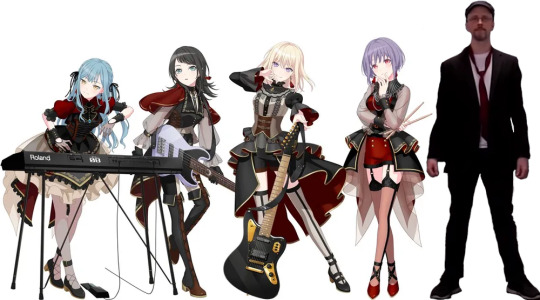
It's 2008, and Doug Walker is confused.
The famous film critic is doing a ten-year retrospective on Pokémon: The First Movie (1998). While watching the opening scene, in which a group of scientists explore a jungle, he poses a series of questions: "What are those things? Who are you? Where are we? What's that thing? Where am I? Is this Earth? Are we in another dimension? Is this the past? The future? The present? What's going on?! Where does this even take place?! Oh, my God, I'm, like, one minute into this movie, already I'm totally lost!"
To Walker's credit, Pokémon is a notoriously impenetrable narrative, known for its high complexity and thematic depth. As he explains: "For those of you who don't know what [Pokémon]'s about, I can't help you because nobody knew what the hell it was about. [...] Nobody could follow it. The only people who understood it at all were the kids."
A similar confusion descended upon me as, on the recommendation of several people in my orbit who called it the criminally underrated sleeper hit of the season, I watched the first episode of BanG Dream! Ave Mujica. They compared it to Umineko, Madoka Magica. None of them told me the show is a sequel (to 2023's BanG Dream! It's MyGO!!!!!), nor any other crucial bits of context: that plot details and twists have been foreshadowed via ARG; that there are music videos for the songs the show's band plays, themselves containing oblique hints to the narrative; that the band itself is real, not in the vtuber sense where rigged anime girls bob their heads on stream but in the sense that each character is voice acted by the members of a real five-person band called Ave Mujica that plays live shows in goth costumes.
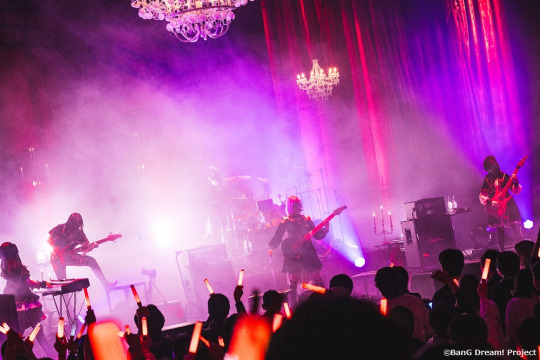
Oh no, I thought. I've stepped into a bear trap!(!!!!)
My initial confusion mostly stemmed from the show expecting the audience to already know all the characters, not simply the five members of the band Ave Mujica but also the five members of the band MyGO!!!!!, who are the main focus of the predecessor series. There are few establishing shots, few immediate character beats that cause one character to stand out from the rest, and the character designs have the traditional sameface of idol anime, so hair and eye color are often the only notable aesthetic differences between them. I watch a lot of anime, and sameface doesn't usually throw me, but here it was a struggle to tell some characters apart (particularly Ave Mujica's two blonde guitarists, Uika and Mutsumi).
Disorientation can cause one to stop thinking at all, though, even to understand things that are perfectly understandable. The irony of Walker's baffled series of questions about the opening scene of the Pokémon movie is how most of them pertain to the setting, when the scene's setting (the real-world nation of Guyana) never appeared before or since in the franchise; even the most dedicated six-year-old had as much ability to answer questions about it as Walker himself. It's not even important, really, in the scope of the plot. It's a jungle somewhere, some distant land. It's in one scene and disappears forever. But Walker, like most parents of 1998, encountered a few details he couldn't understand (the franchise's foreign-sounding name, the endless array of unique monsters) and gave up trying to understand anything at all.
In Walker's defense, the most insidious aspect of confusion is not knowing what you don't know. A Pokémon fan watches that opening scene, well aware of the typical setting of Pokémon, and thus knows that this jungle setting is someplace new, some foreign locale, something they're not supposed to know. Walker cannot, at a glance, discern that. To him, maybe this jungle is the primary location where the action is set. Maybe he really is at a disadvantage for not being aware of it already.
The trick to understanding Ave Mujica is that the five members of MyGO!!!!! do not matter nearly as much as their screentime suggests. There is some connection, as two members of Ave Mujica (Sakiko and Mutsumi) were previously in a band (CRYCHIC) with three members of MyGO!!!!!, and Sakiko's abrupt and unexplained departure from CRYCHIC is the root of the interpersonal drama between Sakiko and Mutsumi. Otherwise, the MyGO!!!!!ites serve as outsiders to the main drama who look in and occasionally comment on it; not knowing anything about them is fine. Once I figured that out around Episode 3 or 4, the show became generally comprehensible.
I think.

It's 2019, and Doug Walker is confused.
Everyone is. A collective confusion as, during the climax of his avant garde musical reassessment of Pink Floyd The Wall (1982), an anthropomorphic mustelid slithers onto his shoulder while singing a Cockney rendition of "The Trial". Across a series of discombobulated fantasy landscapes, Walker has been regaled by this and several other digital creatures designed with an almost obscene attention to detail, lavish fur and fabric textures far beyond the pale of Walker's more workman-like VFX flair. If there was context, it has been lost in the characters' impenetrable accents and vocal layering. All anyone watching can do is ask:
What are those things? Who are you? Where are we? What's that thing? Where am I? Is this Earth? Are we in another dimension? Is this the past? The future? The present? What's going on?! Where does this even take place?!
Nobody can follow it...
Except Doug Walker. This isn't the reason he's confused. If anything, he is oddly, uncharacteristically accepting of the situation. He is a critic best known for animated facial expressions and wild gesticulations, but here he stands perfectly still almost the entire length of the song, even as the CGI creatures pluck his hat off his head or lift him bodily into the air or toss him into a little spike-studded Doug Cage. His face is stone.
No, this is a Walker who exhibits, at last, mastery over the raw facts of narrative. It is not plot, character, or setting that confuse Walker about The Wall. When he criticizes the song "Another Brick in the Wall Pt. 2", he correctly assesses that the song is about the cruelty of the education system. What he's confused about, lacking the cultural context of British grammar schools in the 1950s, is what this means, how to interpret it. He can only do so in the frame of the suburban American education system he remembers, and so ascribes to the song meaning relevant to that context; namely, that school isn't that bad, that teachers can be nice, and that anti-school youth sentiment is meaningless counterculture. It's a misunderstanding, not of fact, but of heart. "Pretentious," Walker calls it, a word he repeats across the video. Pretentiousness is a fixation of Walker's. He loves the word; he uses it often. It's perhaps the perfect word for a workman-like man like Doug Walker, one of the first true outsiders to achieve success in the democratized media landscape of the internet.
"Pretentious" means the author believes their work possesses more meaning and importance than the critic can derive from it.
This confusion of interpretation struck me too as I watched Ave Mujica, even when I understood on a summary level the plot and characters. In the first episode, one of the few characters to distinctively establish herself is Ave Mujica's drummer, Nyamu, who starts a catty argument with the band's keyboardist and founder, Sakiko. The crux of the argument is simple. Part of Ave Mujica's gimmick as an avant garde act that blends live music with acted skit segments is that its five members wear masks on stage, concealing their identities. Nyamu, in Walkeresque fashion, wants to dispense with this "pretension," claiming to be bored of it. Her true goal is mercenary; she believes, as the only band member who is not already established in the entertainment industry, that publicly associating herself with her more famous bandmates will elevate her personal profile.
Sakiko, for whom this project is an artistic venture of deep psychological importance, rejects her proposal. But Nyamu disregards her bandmates' wishes and forcibly unmasks them at the next concert anyway.
I understood the argument. What I didn't understand was how to feel about it, how interpret Nyamu's role in the story. In a vacuum, I could only imagine she was intended as the show's villain. She is vain, petty, a shameless social climber, self-absorbed, a YouTuber, and also the driver of the initial conflict that causes the other bandmates to spiral psychologically out of control. Beyond that, she is commercial. In my preconceived cultural understanding of "fiction about art," the sellout is the villain, and the person with legitimate artistic vision (in this case, Sakiko) is the hero. The rest of the first episode supports this reading: it focuses on Sakiko's perspective and home life in a way that lends her significant pathos, while Nyamu exists solely to cause her grief.
Yet the rest of the show does not support this reading. When a band member has a schizophrenic break a few episodes later, Sakiko is framed as the core cause, due to her demanding auteurism. Nyamu, who sparked the inciting incident, is never blamed, either by the other characters or by the narrative as she slips away, unregenerate, into a minor and isolated subplot. She never abandons or even interrogates her crass commercialism, and despite being the most replaceable member of the band and the least interconnected to the others' social circle (she appears, actually, to be a college-aged adult while everyone else is a high schooler), nobody suggests she be replaced when the band breaks up and reforms. Nobody demands anything of her at all. Nobody even really seems to see her as a problem.
I love it. I love it when shameless little shits don't get any comeuppance at all. I love Nyamu. (Honestly!)
But how am I supposed to interpret her argument, within the framework of Ave Mujica as a story?
The obvious interpretation is that Nyamu is correct, or at least in wake of the show's ambivalence toward her, not wrong. Cynical commercialism has value, is at least an important consideration for artistic decisions. This interpretation makes sense considering it's the artiste Sakiko who winds up shouldering the blame for the band's internal collapse, but at the same time it's a bizarre proclamation to make in a show that is otherwise so concerned with rendering Sakiko empathically, with exploring her psyche and motivations, and with -- ultimately -- selling the audience her artistry. Ave Mujica, as I explained, is a real band. All the goth flair, the arcane skits, the oblique narrative hints, and the doll symbolism that are core to Sakiko the character's artistic vision are also core to the real-life Ave Mujica the band. It's inconceivable to me that the show is actually dismissing its own aesthetic as "pretentious." Why, then, does its own in-universe Nyastalgia Critic go unchallenged, escape unscathed? What does it mean that these criticisms emerge not from unconnected outsiders (even with five members of MyGO!!!!! right there, with their significantly more down-to-earth, more workman-like band) but from one-fifth of Ave Mujica itself?
What, exactly, is Ave Mujica's identity?
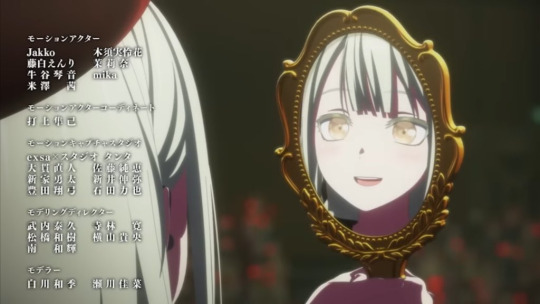
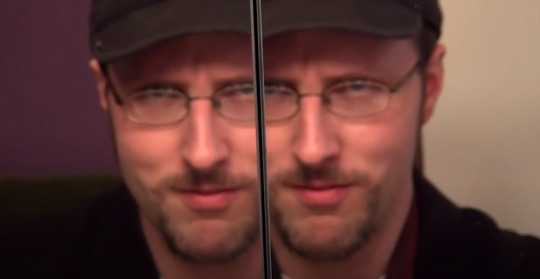
It's 2013, and Doug Walker is confused.
Existentially.
The video is titled "The Review Must Go On," with an ominous subtitle in the vein of End of Evangelion: "Demo Reel Finale." Something, indeed, is coming to an end here, and it isn't just Doug Walker's lifelong passion project.
In this postmodern künstlerroman, Doug Walker stares into a mirror, but what he sees is not Doug Walker. It is his past and it will be his future. (Is this the past? The future? The present? What's going on?!) It is the fixed and unchanging edifice of 18 long years and counting, an entity unstuck from time, who, despite changes to format, site, contemporary taste, and the internet itself, remains immutable. It cannot be denied, cannot be destroyed, can only -- briefly -- be bargained with.
And Doug Walker bargains. "Not every week," he says, staring his down his creation. "Once every two weeks." His creation, only somewhat put off, accedes. (Now, in 2025, it's once a week once more.) A single word: "Done," and the deal is made.
"Alright then," Walker says, with a beleaguered sigh. "What's next?"
The cold voice replies: "I think you know what's next."
Walker does know. He returns to his desk, where he had been typing the script to the Demo Reel Finale, and dutifully writes what he has known all along. Donnie DuPre, the main character of Demo Reel, that lifelong passion project, that original creative work, was always him.
The Nostalgia Critic.
It's a final surrender. There will be no more passion projects. No delusions of artistic accomplishment. None, at least, that don't involve this thing that Doug Walker has become, this thing to which he has given the rest of his life.
This moment mirrors the argument between Nyamu and Sakiko. Though Walker claims otherwise in the video, the decision to revive the Nostalgia Critic is clearly commercial; the Nostalgia Critic is popular, Demo Reel is not. Walker has abandoned his artistic vision in favor of what sells. Nyamu has won.
Except it's Sakiko, not Nyamu, who makes the demands that the Nostalgia Critic makes of Doug Walker. "I am not going to let this band be just a passing fad," Sakiko says. "I told you. Give me the rest of your life."
Doug Walker is giving the rest of his life to the Nostalgia Critic. Is trapped by it. As Ave Mujica progresses, its members become similarly ensnared. I claimed previously that Nyamu is never punished by the narrative, never challenged by the other band members or blamed for her actions, nobody ever attempts to get her replaced, but the opposite side of that coin is that she is incapable of getting herself replaced despite her desire to use the band as a stepping stone for a personal career. Though she gains industry connections via a bandmate's actress mother, she is crippled by the memory of one of Ave Mujica's most perplexing images, an image that similarly left me at an utter loss: the guitarist Mutsumi, collapsed in a disassociating stupor, on stage before an audience of thousands.
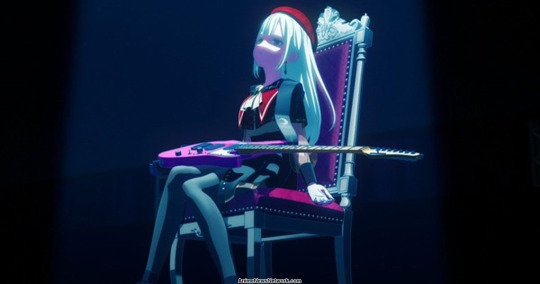
This moment is the beginning of Mutsumi's character arc, in which she is consumed by her band persona, Mortis, in a literalized split-personality storyline that itself has obvious parallels to Doug Walker's relationship with the Nostalgia Critic in The Review Must Go On. What fascinates me about this moment, though, is the reaction of everyone watching. The moment Mutsumi unexpectedly collapses, Sakiko deftly weaves it into the band's narrative, concocting a story about how the song they were playing lulls the "dolls" (Ave Mujica's band members) into eternal slumber, before abruptly ending the entire concert. The other four members step off the stage, leaving only the collapsed Mutsumi in the spotlight, motionless and silent.
The audience loves it. The band explodes in popularity. It's such a memetic event that the fans become disappointed when it isn't repeated at the next concert; Nyamu suggests that they repeat it, even to the point of showing up to concerts and not playing music at all. "Ignoring the audience's expectations -- what's the point of that?"
Nobody, in or out of the band, reads Mutsumi's collapse as a cry for help.
She can't cry for help. No matter what she does. When the band announces their breakup, she screams hysterically on the stage, even as the other four members are quiet. "Mutsumi was cooking until the end," a social media post later remarks. She has a breakdown on the street, arguing with her split personality in Gollum/Smeagol fashion (complete with camera angles swapping back and forth to indicate her two selves), and though people gather around and film it, the audience's only possible interpretation of the event is that it is a promotional stunt for the band. Even Nyamu, haunted by that image of Mutsumi collapsed in the chair, isn't haunted because of the psychological toll her actions inflicted on her bandmate (and, eventually, primary yuri shipmate), but because she believes Mutsumi was acting, acting so ingeniously that it torments Nyamu she cannot achieve that same level of skill.
Mutsumi is entrapped within the narrative ambiguity of Ave Mujica. Like Doug Walker, everyone watching her is confidently confused, only able to interpret her actions within their own contextual framework.
What is the contextual framework of Ave Mujica, though? It is a Babushka doll of meaning, an anime based on a real band that contains within it contradictory proponents of artistic vision and common-denominator commercialism, that is itself contradictorily artistic -- if my struggle to interpret it is enough to suggest -- and commercial, the way its poetic symbolism about dolls and control is draped on samefaced 3D anime girl models that move stiffly and unconvincingly. But the show is willing to make those 3D models contort their faces into distinctively un-idol-like (distinctively Doug Walker-like) maniacal expressions, to throw them on the ground and scrape open their knees with blood streaming out, to have them hurl each other down the stairs in fits of rage, to pair them in incestuous yuri couplings. The story both gesticulates toward a cynical, darker take on the idol industry like Perfect Blue or Oshi no Ko, yet is part of an established idol franchise selling these characters as actual idols. Even in the narrative, the depiction of the idol industry is confused; the band seems to have no managers, no agents, nobody telling them what to do. They don't even have secretaries; bassist Umiri handles scheduling and itineraries. Men only exist in the world of BanG Dream! as fathers or grandfathers; every behind-the-scenes staffer at the concerts, in fact every concertgoer, is female.
Nyamu is not Akane Yonezawa, Ave Mujica's real life drummer. But both are industry outsiders in their first real role, compared to their four bandmates who are already established. Rich girl keyboardist Sakiko is not Kanon Takao, but Kanon Takao was winning international piano tournaments in Milan at age 10. Where is the line between fiction and reality? How real is this anime, and how fake is this band? How much is the Nostalgia Critic a character, and how much is he Doug Walker with a hat?
And isn't it within this endless array of ambiguity, of questions, of confusion, that Ave Mujica ensnares? "Give me the rest of your life," Sakiko says, but with these ARGs and multimedia comb-over-it-with-a-magnifying-glass details and crossovers with other bands, whose life is she demanding? To the incurious, the Doug Walkers, confusion is enough to dismiss out of hand. But for those who want to know more, there are an endless amount of dolls to open...
Perhaps Walker was right, all those years ago in 2008, to not gaze too deeply into the world of Pokémon. It is a franchise, after all, that has exploited the human instinct toward curiosity to become the highest-selling media property of all time.
("Ignoring the audience's expectations -- what's the point of that?" Nyamu says.)
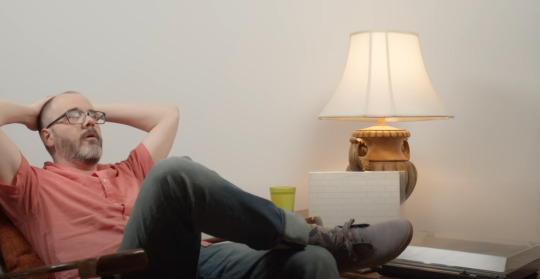
It's 2021, and Dan Olson is confused.
He is a critic criticizing a critic. In this case, he is criticizing Doug Walker's review of The Wall. Unbelievably, this criticism has over 2 million more views than Doug Walker's The Wall video does. Over twice as many people have seen this criticism than the thing being criticized.
Olson asks:
"What is this? Why does this exist?"
He doesn't know why Doug Walker would do this. Why would he put such elaborate effort into a musical review of The Wall, something Walker barely seems to understand or care about at all, something he only seems to have watched for the first time in preparation for creating the review. Walker's lack of curiosity baffles Olson, particularly because it is balanced against the effort on display in the review itself. How can someone spend months on costumes, visuals, parody lyrics, and celebrity guests, all to call something pretentious?
What Olson doesn't realize is that there is a Doug Walker, wannabe filmmaker, involved in this production, a Doug Walker with -- for better or for worse -- an artistic vision, who is willing to go to great lengths to apply that vision.
But someone else is running the show. Someone to whom Doug Walker has given the rest of his life. He's called the Nostalgia Critic, but, as in Ave Mujica, this avatar of commercial greed is only an abstraction, isn't it? A figment of ambiguity in which all cries for help, no matter how loudly they are screamed, can be extinguished. There's someone else, unseen and unacknowledged, with real control over these dolls, the one who forces them to perform as perfect time capsules, ageless and eternal. I'm not sure what they're called for Ave Mujica, but for Doug Walker, their name can be found with a bit of searching: Mike Michaud.
"Let me show you," says that anthropomorphic mustelid, Lucy Lacemaker, as the first notes of The Trial begin. "Let me show you what happens when your dreams no longer need you."
96 notes
·
View notes
Note
Hello I have an ao3/fandom thought I think you might appreciate (sorry in advance for the long ramble in your inbox, I apparently have a lot of thoughts on this topic). I think this fandom (mostly the main 911 show, but I've seen it a bit for lone star too) conflates the 'critical' and 'bashing' concepts far too much which causes more drama and hurt feelings than is warranted.
To me, those are two different things - the concept of bashing is, to me, taking a behaviour and pushing it to its absolute extreme and seeing what results (e.g. Diaz family bashing fics where Helena and Ramon specifically want to have permanent custody of Christopher to keep him dependent on them). And don't get me wrong, this can be very fun when you're in the mood, much like a stupid horror film or a romcom!
Comparatively, at least to me, the idea of a 'critical' tag is exploring what a character actually does in canon in a way the show doesn't. So, to follow with our example, a Diaz family critical fic might explore the way Pepa is rude about Shannon within Chris' earshot, or that time Helena hired caterers and also did all the cooking herself, does that make sense?
I've been seeing a lot of 'Eddie bashing' fics and concepts in the last couple weeks, and honestly to me a lot of them aren't bashing in the way I understand the word - criticising Eddie for what he did with Kim and Marisol, or for the kitchen scene with Buck, or his 'mistakes' with Christopher, and exploring some realistic consequences of those canonical actions isn't character bashing to me (although I understand it might be to others)
I don't really know what my point is I just kinda thought you might get this and maybe have some thoughts of your own on it? I just think the fandom might be a nicer place if we separated out the two concepts a bit more sometimes ¯\_(ツ)_/¯
no I totally get you and I agree! "critical" and "bashing" are WORLDS apart, normally.
"critical" allows for growth. it acknowledges the problems (in Eddie's case: his treatment of women in his life, his treatment of Buck, his tendency to make decisions without consulting others, etc), but it doesn't exaggerate them. "critical" does not outright demonise poor behaviour, but it spotlights it, and narratively frames the problem AS a problem that should be solved.
"bashing" on the other hand, is often exaggerated. it makes no room for growth or redemption, the opportunities for either are often destroyed off the cuff. there is NO positive resolution when it comes to "bashing" fics because they're not meant to be used that way. they exist as catharsis for the fans who are angry/embittered/upset/hurt by a character or story arc. it is MEANT to be harsh and cruel and sometimes outright OOC, because the entire point of them is to bash the character and make them as irredeemable as possible, so when Bad Things Happen to that character, the audience is HAPPY about it.
this fandom is far from my first, but it is THE first I've been in where the line between "critical" and "bashing" has been so thoroughly blurred and often just ignored outright. I've seen people tagging "critical" posts/fics with "bashing" and vice versa, and it always frustrates me. these terms exist for a purpose. there is a difference between these terms for a purpose.
I think this confusion - not to play the generational card here - is mostly coming from gen z fans of the show. This is, for many of them, their first Big fandom, and it shows in the way they behave. there has been a disturbing trend that I've noticed with younger folks, especially recently, where any sort of criticism is viewed as "cancelling" or outright "bullying", when that's not the case at all. and so they've conflated this idea of criticism = cruelty and they've imposed it onto fandom content, ignoring fandom etiquette and rules that have been here for decades already, in order to accuse those of us who ARE "critical" of being bigoted or cruel.
there's also a strange rise in parasocialism, especially in this fandom, where some fans act as though these characters are real people and can be realistically hurt by the "critical" side of fandom. which to me is just baffling. they're not real. I could go right now and write a fic where Eddie has to gargle hot coals, and nothing would actually happen to anyone in real life. Hell, I could go and write a fic where Buck gets every single bone in his body shattered into dust, and still, nobody would actually be hurt. because he is fictional. he doesn't exist.
I'm getting off track.
the point is, yeah, "critical" and "bashing" are in the same neighbourhood of fandom content, but they're on totally different streets. "critical" is looking at the house being built and thinking "oh, not the best foundation for something that big". meanwhile "bashing" is down the block staring at a crackden infested with rats and black mold and saying "haha time to set it on FIRE!" you know what I mean?
62 notes
·
View notes
Note
One thing that most fans of the show do is leap into conclusions that are not really implied anywhere or make any sense whatsoever, just so they can justify how “genius” the storytelling is. I kid you not, in most social media spaces they’re are lots of viral posts of people saying they saw the Kerri scene as a foreshadowing to Rogue One in the sense that he found a sister in Jyn (not that she’s actually Kerri but she’s a “representation” of her role on his life) which is not only dumb but also cheapens the narrative from both the show and the movie - not to mention this weird idea that women are all interchangeable and replaceable. But they can all pat themselves on the back to say how smart they are for “figuring it out”, while calling everyone else “media illiterate” with their full chests.
Oh God, the Kerri thing is so frustrating. I'm actually not super shocked that people who are desperate to like the show are making up stuff in their head about it. Because uh, let's look at the facts here:
Kerri is central to the opening of the show. A lot of people who barely cared about Cassian in R1 are basically introduced to him as "the guy who is looking for his lost sister". In a brothel, of course, because this isn't your dad's Star Wars! We look at all the ways in which the world is real and that means mostly implying nonconsensual sex with Latina women, apparently. Anyway.
Cassian is really intense about finding out her whereabouts in that scene. We see how he has made himself extremely unsafe to follow up this lead. This must be really important to him! Next, even as we mostly deal with the fallout of the cop killings, the show gives us a whole scene to introduce us to who Kerri is and why Cassian feels so badly about not having found her. Again, this must be really important to him!
And it's not just in the moral or interpersonal implications, by the way. It's also that we as the audience are introduced to Kerri with a scene that took a considerable part of the budget to film. Most people will not think about that consciously, but this still lets you assume "oh, this scene looks important!". It's in a completely new setting (jungle/forest setting. expensive to film. you have to lug all your equipment and cast and crew to the location). It's all-new, child actors in elaborate costume (for real, this looks expensive. filming with kids is notoriously expensive because of work-hour constraints, they had to cast all these kids, and make all those costumes and put them in make-up etc.). The planet has wide-shots with fully animated landscapes (again, looks expensive!). And then the planet has its own language. And all the child actors are speaking it. Someone got paid to create that language, and all these kids had to be taught that language, which I assume is paid work-time for them?
So, again. Wow, this girl must be really important to the plot of the show I've just started watching! ...nope.
Halfway through the first season, we get that one really strange line from Maarva, telling Cassian without any prompting not to look for his sister anymore, because she's for sure dead. I think all this was is a lazy fix when they realised at the end of the season they had completely forgotten about that whole plot line. But because it's so weird and sudden and we have been so primed to keep an eye out for this plotline, I straight up assumed she knew something she wasn't telling him, and this was going to become plot relevant. But no, Maarva dies off-screen and we never look back at Kerri this season. Huh.
There was a way to spin dropping this storyline completely, and they were clearly trying to go that route: Since they're so dead-set on telling us that losing Cassian Andor was a tragedy to the galaxy and he sacrificed all his potential on the altar of being a Force-sent messenger (in the strangest read on Rogue One's message I could have ever imagined), I think they were going for making Kerri's fate part of his tragic loss. Implying that, if only he had survived Scarif, he could have found his sister!
The trouble with that is that with the exception of the literal first scene, the show completely fails to convince me that Cassian is even trying to find her, or thinking about her at all after the first arc of the show. When he meets Luthen, we learn he was out of prison and out of the fight in his late teens. And yet, he makes a complete fool of himself when trying to find out about Kerri a decade later. This is not a man who has spent the past ten years doggedly searching for his sister! This is an idiot who got a lead for the first time and is fumbling it! And they clearly knew how to do visual shorthand of "Cassian is haunted by his little sister" - show her in brief flashbacks intermittently! But they immediately stop bothering to do that, so she disappears from his narrative completely. The only time someone brings her up is when Bix refers to her during a fight, to pay lip service to how he maybe feels like he failed to protect Kerri and is projecting on Bix. But that's such a stretch, because he was taken away from his sister against his will - yes, he may feel, irrationally, that it was still somehow his fault. There is a way to read him remembering her asking him to take her with him as that. But when you've invested so little time into it, that's a pretty big stretch and lot of telling instead of showing going on. And he doesn't even react to it!! He seems completely uninterested in the topic of his sister!
And then, maybe in the attempt to somehow turn their dangling thread into a tragic missed opportunity for Cassian, they briefly splice a shot of her into the final episode montage. But it fell completely flat for me. We haven't heard about Kerri in half a season. We have not seen evidence that Cassian has wasted a single thought on her in literal years. Why is he thinking of her now? What are we supposed to connect this to? Maybe saving Kleya made him think, well, at least I saved that one? If so, I genuinely don't like that, because it makes the case that Cassian sees all women in his life as vulnerable, exchangeable damsels whose fate depends on him saving them. Which could be an interesting character trait! I've actually used that in my own fic! But you can't suggest that at the end of your show and then move on - unless you think that's a correct view of the world and you, the writer, have nothing to add to it... almost like... you don't think of women as complex three-dimensional people...
Also, "Jyn reminds him of his sister" is a wild take. This woman is presented to him in shackles with a laundry list of crimes and has just knocked his buddy out with a shovel. She steals a gun from him and says the mission is only fair if she has equal means to murder him as he does her. Impossible to distinguish this from his angelic little sister, who we know absolutely nothing about except that she was cute and tiny and is probably dead! Then he watches Jyn be competent in both defending herself from imperial violence and dealing with extremist - both things that Kerri emphatically couldn't because she was a child, which is why he may feel like he is at fault for not protecting her. Then they have a difference of political and philosophical opinions. Pretty unlikely this reminded him of his pre-school-age sister? Then he's clearly shown being flustered and elated and affected by her physical presence in a way that I would find deeply concerning re: "spiritual sister".
(Look, we all know why a certain group of people is so adamant to connect Kerri and Jyn. They're trying to put Jyn in some kind of sibling category so that it becomes "gross" and "out of character" to imagine Cassian having a thing for her, because they feel that possibility would threaten their read on the character and his relationship with his ex.)
But the thing that is the most frustrating about dropping Kerri completely is that, again, they primed us to believe she and Kenari were going to be extremely important. They leaned on it hard in the promotion, too, about Cassian being "a migrant" or "a refugee" and all that lipservice to Mexico-US relations... and it went nowhere. It wasn't important at all. It wasn't a main part of the plot and we never saw it being a motivator for Cassian. And, what's worse - finding Kerri was the only thing we've ever seen Cassian do because he chose to. In the whole show. (One could maybe count rekindling his relationship with Bix, except... he did that off camera. We didn't see it. And when he did try to choose her, she didn't let him.) It's the one stated goal he had, it's how we are introduced to the character, and the show fucking forgot about it. That is terrible writing.
62 notes
·
View notes
Text
essay on the UFO motif in RGU (and YKA) under the cut
one of the things that makes aliens so interesting is their versatility. YKA uses the classic alien invasion trope as the set up for its narrative; aliens as outsiders, infiltrating human society and sowing paranoia. as anyone who's seen the show knows, this premise is soon subverted. fear of the other is used by the invisible storm girls to justify securitization and eventual militarization, while the main characters work to break down the self-other dichotomy.
RGU doesn't feature its UFO motif so prominently; or anyway, it's not present from the beginning of the show, but instead scattered throughout. this marginality does not make the motif any less important, however. let's take a look at the text to see how the motif itself is used.
in almost all instances, UFOs and aliens are associated with the shadow girls. the first time they're mentioned is in episode 9.
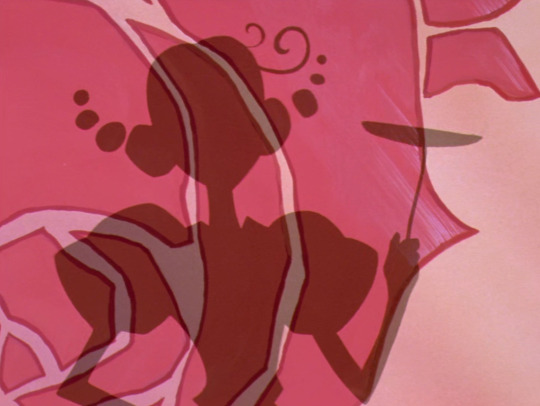
in the skit, A-Ko insists she saw a UFO, while B-Ko says it must have just been a shooting star. they argue about this for a while, until A-Ko changes the topic to disillusionment: she knows that Santa Claus, wizards, fairies, princes on white horses, and kind-hearted, true friends only exist in fantasy. but she begs to be allowed to keep her belief in UFOs.
the inclusion of UFOs in this scene may not seem particularly meaningful. the skit draws a constrast between childhood illusions and adult cynicism, notably including "true friends" on the list of fantasy creatures. with hindsight, though, this choice does seem purposeful. maybe A-Ko wants to believe in what the UFOs represent, which is more clearly spelled out as the show goes on.
in episode 12, the shadow girls list "normal things" for people to do: study normal subjects, get a normal job, fall in love normally, get married normally, have a normal family, and live a normal life. but they conclude that being normal "has nothing to do with them" and proceed to board a UFO so that they can "go back to what's normal for them."
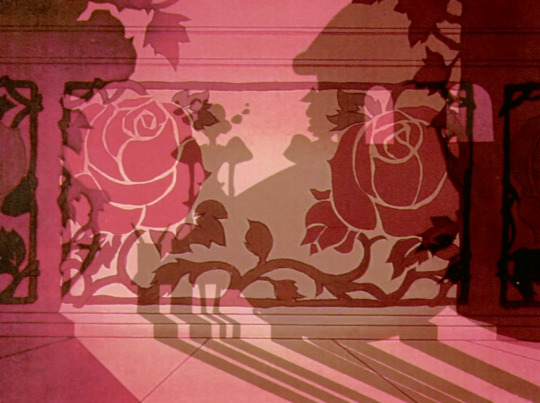
this is an obvious parallel to Utena's arc in the episode, where she rejects how society wants her to act and reclaims her own normal. but it's also telling us something about the shadow girls.
the shadow girls don't just "want to believe" in UFOs--it seems that they are aliens. they're "from Planet Kashira" according to Ikuhara; "Inhabitants of Planet Kashira" is the title of the shadow girls track on the first OST.
I think what this is telling us is that the shadow girls are outside observers. they're not natural citizens of Ohtori but exist at a remove from it. they can interact with the story, but they're a constant reminder that something beyond it exists--that the "rules of the rose crest" are not the laws of the universe.
from episode 13 on, the shadow girls put on their plays after returning to earth from their UFO. episode 24 ends with an encounter between Suzuki, Yamada, Tanaka and the UFO. we see the "monkey-catching-robot" again; once it successfully bags its prey, it enters the craft and flies away.
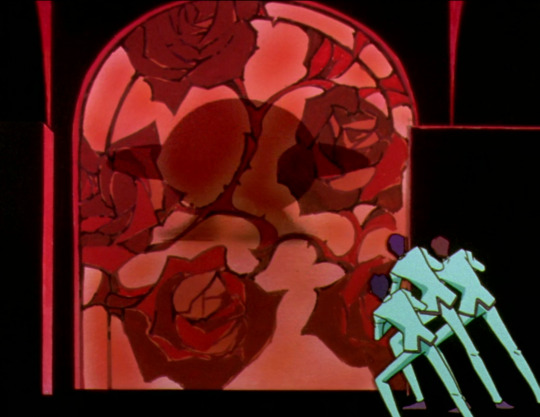
I could probably provide a reading of this scene if I tried, but mostly, I think it's there to round out the Black Rose arc. it's rather tongue-in-cheek; the UFOs are a part of the silly side of RGU. this eccentricity is humorous, but in my view also tied to the theme of individuality, which requires unapologetic strangeness. there's also something to be said for RGU's use of the inexplicable and uncanny, which often have a far deeper impact on the audience than concrete story elements.

in the final arc, the shadow girl plays begin with their UFO crashing into the chairman's tower. this is as clear a metaphor as one can hope for: the shadow girls and their alienness are a destabilizing force. maybe they're not revolutionaries--the crash appears to be accidental--but their randomness, their strangeness, their lack of propriety are a threat to the order, the masculine rule represented by Akio.
that's about it for the shadow girls. but as I mentioned, aliens are brought up in another context: the episode "Nanami's Egg."
the line "Nanami's some kind of space alien" is rather famous, and that part of the episode isn't hard to read. she's worried that she's seen as a freak, an other, by her peers. however, we also get a return of the motif at the end of the episode.
after abandoning her egg, Nanami is unable to put it out of her mind and runs out into the night to find it. she sings and dances with it, but after a bedtime conversation between Utena and Anthy, the show cuts back to Nanami, now bereft of her egg again.
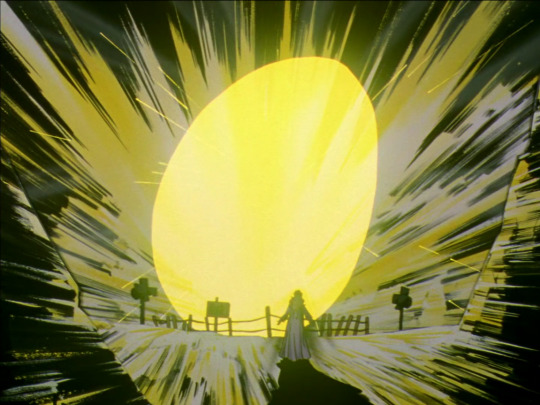
she finds it, grown 100 times larger, propped up in the woods. she promises never to abandon it again, but it seems not to forgive her, shooting strange beams at her in attack. then it fades and lays before her, cracked open.
I think this scene is adding a new dimension to the egg metaphor: in the final moments of the episode, the egg becomes a symbol of Nanami's self. she tried to be rid of it, as she killed the cat--but just as she did then, she found herself regretting it. but she's unable to forgive herself for it, feeling that she's betrayed herself and lost something very important for the sake of a false normality.
to finish this essay, I'd like to reflect on how the motif of alienness is reflected in the larger themes of RGU. in the episode 11 commentary, Ikuhara wrote the following:
I tried to live true to myself. “You’re just like an alien,” someone said to me one day. They must have been telling me, “You’re not normal.” In other words, apparently “living true to yourself” means “living as an alien.” And so I became “an alien all alone in this world.”
alienation, individuality, and deviance are all major themes in RGU. the shadow girls present a positive image of what it means to be an alien: they are carefree and unconstrained. however, for the other characters, being an alien--an individual--is not so easy. it sets them apart from the social order and may even put them in danger. therefore, RGU depicts the defiant joy of deviation, along with the pain that often accompanies it. individuality may be a threat to the system, but that's exactly why it's difficult to achieve.
finally, "alienness" serves as a great metaphor for self-other encounters, as I've touched on throughout this essay. if we are individuals, that means we are fundamentally separate from one another, because we cannot experience each other's experience. thus, we are each of us aliens to each other.
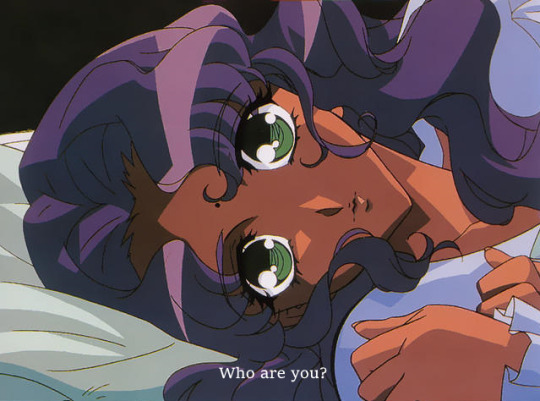
Anthy asks Utena this question as if she truly does not know, as if Utena is some mysterious being encountered in a dream. they are drawing closer together, and so the fact of their alienness is only becoming more pronounced. it will take the rest of the show to find out if contact is possible.
120 notes
·
View notes
Text
Ahead of the Spare Me Your Mercy Finale premieres, here's an interview with screenwriter Lux on the portrayal of Euthanasia in the series
(source: mgronline; machine translated with minimal edits, my apologies for any inaccuracies)
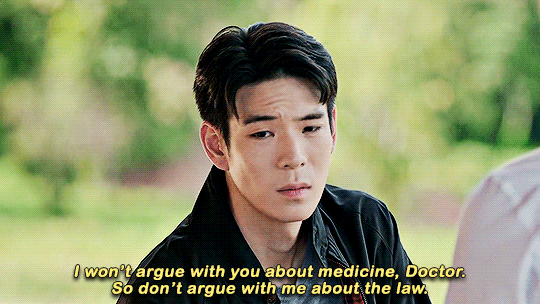
The series "Spare Me Your Mercy" (Thai title: การุณยฆาต), airing on Channel One31, is approaching its conclusion. Starring Tor Thanapob Leeratanakajorn and JJ Krisanapoom Pibulsonggram, the series is based on a novel by Dr. Sam Isaree Siriwannakulkorn under the pen name Sammon. Known for works such as Manner of Death, Triage, Bite Me, and the recent 4MINUTES, Sammon's novels often intertwine themes of BL (Boys' Love) with medical narratives.
However, in this Channel One adaptation, the producers emphasized that the focus is not on the BL aspect but primarily on the medical themes. Lux Sirilux Srisukon, the creator and scriptwriter of Spare Me Your Mercy and a skilled member of the production house, explained the reasons behind adapting this story and delved into the nuances of the plot. Even though euthanasia is not yet legal in Thailand, the story explores how patients may make end-of-life decisions without violating medical ethics.
“Sammon's novels are mostly BL novels and include numerous love scenes. However, we deliberately chose not to present it as a BL story. While the characters are two men in love, we approached it with a dark drama style. The characters are gay, but we don’t offer [fan]service in every episode or include NC (explicit) scenes. This was our intention from the beginning when we started making this series.
We did this not because of censorship, airtime or actors. But because what we are trying to tell was heavy and serious. Having NC would steal the attention of the story because what we were going to talk about was dark drama and euthanasia. Some fans of the novel might be disappointed, but we think we have other fun things to offer, even if there’s no NC scenes. Our way of thinking is that this is not like a series that serves [the audience] (t/n: I understand Lux is trying to say that this isn't a feel-good, healing vibes serving drama).
For instance, in traditional male-female dramas, if the protagonists fall in love, they simply do. Similarly, this story is like any typical drama—it’s not about portraying same-sex or opposite-sex love, but it is just two people who love each other. We depict love scenes the same way we would in any regular drama. Viewers will see that these two characters love each other because we don’t see gay love as different from heterosexual love. It’s just two people finding each other, forming a bond, and falling in love.
When we spoke with the original author, she was also very supportive of this shift because she also wants to highlight the theme of euthanasia. Sammon's focus is also in line with the adaptation but since she is also a Sao Y and a BL novel writer, she understood her audience and enjoyed writing in that style.”
Lux says that she wants to clear up the misconceptions that many people may have that euthanasia must be caused by illness/ medical conditions, not because of life dissatisfaction or laziness and want to inject death.
“We wanted to portray what euthanasia really is because there are many misconceptions. People often misunderstand it in two extreme ways. First, they see it as equivalent to suicide. Second, they see it as an escape for those dissatisfied with life. For instance, some on X (re: Twitter) think, ‘I don’t need to think about the future; I’ll just live my life and then get an injection to die.’ That��s not possible anywhere in the world. That's a misconception.
Euthanasia doesn’t mean you can request an injection to die simply because you’re tired of life. Even in Europe, where euthanasia is legal, there are strict requirements. You must have a certified medical condition specified in the law, endorsed by at least two medical specialists, and the illness must be truly incurable and that you are waiting for death. The purpose of this law is to prevent these individuals from suffering. Instead of suffering for another year, they can die. It's not about being bored with life or lazy to live or not liking yourself when you're old, so you let them inject you with a lethal dose. They don't do that. Many people misunderstand that if you don't want to live, you can go for euthanasia.
But on the other side, some people say they wish the law would pass so they wouldn't have to take care of themselves when they're old. I'm bored, so I'll just go and get an injection. That's not how it works. Even in countries where it's legal, they won't do it. Or if a father has an illness that is still treatable, they won't allow it either. It’s only available for those truly nearing death, as certified by medical professionals. In cases where it is allowed, in countries where this law has been passed, as I explained earlier, and they only provide euthanasia to the relieve suffering of patients who are waiting for death.
And there are some countries that have already passed the law on euthanasia, and they have changed their minds and gone back to using the old law. The term 'euthanasia' itself is not beautiful. There can be many legal loopholes.
For example, a patient is very sick and old, but they don't want to die, but their relatives don't want to take care of them. They go and arrange for euthanasia. But if there aren't laws for it, there will be legal loopholes to allow murder. Some people may not be able to move or walk, but they still want to live. They don't want to die. The most important thing about euthanasia that doctors must discuss, which we will demonstrate in this case, is the patient's wishes. You must do it with awareness and a genuine desire to do it yourself, not pressured by relatives.
It's not like, "Mom, I can't take care of you. You're such a burden. Let's take you to get an injection." We understand that this is a sensitive issue. We don't want to cause arguments, but we want you to understand what we're trying to convey. Think seriously. Because if the day comes when the law needs to be changed and you don't understand it, when you ask yourself if you really want the law to be changed, we won't be able to answer because we don't really understand it.
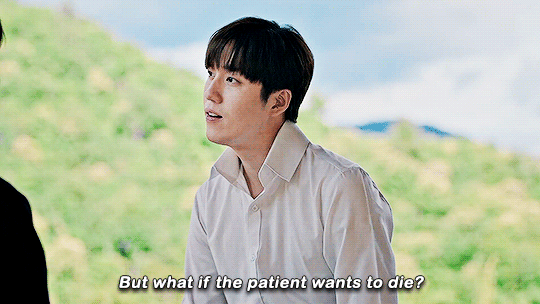
Euthanasia in Thailand — Is It Suitable?
“Euthanasia is a thought-provoking topic. We interviewed doctors, and they said that euthanasia isn't suitable for wealthy people. If you ask a doctor in an expensive hospital, he will say that euthanasia is not suitable for Thailand because [the hospitals] already have everything that patients need to get through their final days well. But the condition is that you need money.
However, for poor people, just getting painkillers once a month is difficult. They have to endure the suffering. The doctor who wrote this article is the one who visits patients' homes. In small hospitals, when they encounter such cases, they think, 'Maybe there really needs to be something. Isn't euthanasia a necessity?'. Poor people with terminal cancer, in excruciating pain, but there is no one to take care of him, bring him medicine, or take them to see a doctor. Do they have to lie down and suffer like that? How are they supposed to live?' The accessibility to and public health welfare of our people are not equal. This is what we really wanted to convey.
I understand that BL fans might be disappointed, but if we focus on NC scenes to make people swoon, the core of the story will change. The weight of the story will go more towards that than the presentation of euthanasia.
The series will also feature other things to consider, one of them being a ‘living will,’ which has been legally recognized for decades. You can write a letter of intent stating that you are seriously ill, unresponsive, a vegetable, and do not need to be resuscitated. It is similar to a will, a 'patient's will', however, if you become unconscious and don't have full mental capacity, you won't be able to do this. And the doctor cannot not save our life because it is unethical. If doctors do not help, it will become a criminal offense, which is the same as letting us die.
This is legal and there's laws for it, but no one knows about it. It can be done without a lawyer, just with witnesses. We make one copy for ourselves and another for the hospital where we receive treatment. If we have the symptoms listed in the document, the doctor can let us go without providing treatment. We have to do it ourselves, relatives can't do it for us. This is not a legal loophole, there is a law for it, it's just not promoted. This is legal tool that can be used instead of euthanasia because it comes from the patient themselves. Everyone can become terminally ill. Cancer can happen to anyone. And when you're in those situations, how would you deal with it if euthanasia is not legal? You have to think ahead about what you will do."

tagging @recentadultburnout who can help vet for me if there are any inaccuracies from these machine translations
#spare me your mercy#euthanasia#jaylerr#tor thanapob#jj krissanapoom#spare me your mercy the series#euthanasia the series#smym#userjamiec#usersasa#userrain#userpharawee#userspring#userrzey#tobelle#thaidramaedit#forfive#rinblr
96 notes
·
View notes
Text
since skelly crews final is about to come out I would like to drop my obscure theory as to who I think Jod might be based on mostly vibes, and a few character traits.
I think he's Jaybo Hood, this kid from the clone wars episode mystery of a thousand moons.
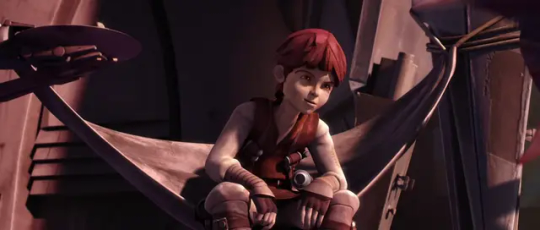
now, at first I was just like "haha their names are kind of similar," but our first introduction to this kid is him having reprogramed a bunch of droids to be his servants, which would align with how Jod treats droids. not to mention his affinity for droids could be a sign of early force sensitivity, much like Anakin in episode I.
secondly, there was his line in episode 4 where he says the air taste like ashy dust and reminds him of his home planet. Jaybo's planet Iego as we saw it in the clone wars was surrounded by a lazer web that destroyed anything trying to leave which would certainly leave a strong impression of ashy dust. As a bonus note, Iego is part of the ash worlds sector. Coincidence? I mean probably, but it is fun to think about.
As a third point, there are similarities that can be drawn between Iego's moon web and the barrier. Star wars is a fan of it's narrative repetition. I think putting him in a position where he's trapped on a planet by a planet wide security system would fall into the "it's like poetry, it rhymes" category.
Now onto things mentioned in interviews.
Jude Law has spoken a few times about how Jod didn't really have a childhood; it was snatched away from him and all he sees when he looks at the kids are small adults. He doesn't understand why they can't just survive, why they're so inexperienced. He has no real concept of innocence.
That would align with a kid like Jaybo who has had to take what he can to get in a pretty rough situation. Not to mention his introduction is sending his reprogrammed battle droid out to the jedi with the message "The venerable Jaybo Hood requests an audience" (venerable beings someone accorded a great deal of respect especially because of age wisdom or character) despite the fact he's a ten year old kid.
Jude Law also speaks several times about drawing inspiration from Han Salo for Jod.
if you look at the behind the scenes notes on wikipidia it says Jaybo Hood was described by Dave Filoni as "a cross between a young Anakin and a young Han Solo."
None of this is really enough for a full theory, I just think its fun to think about. Jod could be someone from legends, someone entirely original, a jedis kid, or somehow a Palpatine clone (given the prevalence of project necromancer in recent media.) Really I just hope they give us some kind of payoff to explain some of their writing decisions.
#skeleton crew theory#skeleton crew spoilers#skeleton crew#star wars skeleton crew#jod na nawood#star wars#jaybo hood#this is really just a brain dump#fan theory#i dunno ive been meening to write this for a few weeks#if you took the time to read this thanks
70 notes
·
View notes
Note
You know, I've always said that there're major problems in how female characters in battle shonen are written, but after going through the Naruto manga again, I'm a bit conflicted, especially with Sakura. I neither like her nor dislike her as a character, but some people critique her too harshly on some things. I think she's poorly written, but only in terms of narrative themes, mostly because she's (almost) completely thematically irrelevant. I think she's fairly well-written in terms of character; she just has an unlikeable personality. Non of the major themes apply to her (No, not even the "new generation surpassing the old" theme. She never surpassed Tsunade. With the later knowledge of how important bloodlines and clans are, she was never going to surpass a Senju, much less a Senju who's always in Hashirama's shadow in terms of legacy). Out of all the main cast, if you remove her from the story, nothing drastically changes, which can't be said for Naruto, Sasuke, or Kakashi. This is bad writing, imo. Haku and Zabuza have more thematic weight than her, and we hardly see or think of him past the beginning. A main character shouldn't just exist without adding anything to the story thematically or in action/wish-fullfillment. I can see this being a drawback for readers who want to self-insert or want to see action-packed scenes for everyone because she's full of contradictions. A character who is capable of combat, but in a team is more suited to being a healer and taking direction from a superior. Someone said to be booksmart but seldom able to use her knowledge in the field, getting caught in the minutiae of facts without being able to properly ably it to being a shinobi like in the chunin exams and later her failed assassination attempt on Sasuke. She tries to use her booksmarts to answer the questions and prides herself on not cheating, but the point is to cheat because they're shinobi. Ibiki later reveals the questions are nonsensical with no correct answers. The only ones who truly "pass" based on being ninja are Sasuke and Naruto because Sasuke understands the real purpose and completes it successfully, and Naruto has really good instincts for the field. I actually like how she fits within her teammates here. It's something that continues for them until the end of the series (Part 1).
--
Her personality is just unlikeable for a lot of people, but that's not necessarily bad writing. She's catty, prideful, arrogant, sheltered, and often overestimates her ability, a lot like Korra tbh--especially the sheltered part. She's portrayed as a normal, boycrazy, studious teenage girl, a wallflower to balance out Naruto and Sasuke's dynamic. She never had to travel or experience the hardships of their world to see how even her own village fails them all and is hypocritical to its own conception/foundation. She's never had to carry out a mission for the state or a client she deeply disagreed with. She can't understand characters who are the thematic cores of the story. So, when she tries to kill Sasuke, she can't even fool him because her espionage skills are subpar, and at her core, she's just a teenage girl who doesn't want to hurt her crush and go back to the past. She's fairly normal but still manages to improve her skills as much as the themes/worldbuilding will allow. By the end, she's nowhere near as strong as Naruto and Sasuke, which was never going to happen, but she's as strong as Kakashi but not as good of a shinobi. The only thing holding her back is her brashness, need for external validation at inopportune times, overestimating her ability, and lack of comparative experience (She's 17. He's in his 30s and has had to navigate more of the undesirable parts of their societies, like Naruto and Sasuke. Again, she's like an average teenage girl). She came a long way in terms of ability. She just comes off as a really unlikeable kid, which, as a result, doesn't allow the audience to properly self-insert or use her for wish-fullfillment/escapism. But I absolutely believe a girl with a personality/character like her can exist. The character writing is pretty strong, I think. It just gets overshadowed by the rest because of the medium, genre, and demographic. Bad writing ≠ likeable (Part 2).
My sense is that in plenty of shonen series, major female characters not tying into the main themes all that well is more of a feature than a bug for a lot of the target audience.
54 notes
·
View notes
Text
Lore Rekindled; The Lore Olympus that should have been
To be honest, I checked out the rekindled version before the original one and now having reading the original as well, it's extremely odd. Y'know goodbye volcanic high where the original was a mess but a group of 4chaners made a parody game which turned out to be of better quality than the original? This is like that but replace 4chan with tumblr users, mainly @genericpuff whose series is pinned in their tumblr blog where you can check all of the episodes, especially updated ones. In this post, I will be praising this series of how it fixes the problems of the original
The Pacing
One thing I notice about lore olympus and lore rekindled is the pacing. Not just the flow of the story but where it chooses to focus on. Now in lore olympus, the pacing is kinda a mess and its mainly to do with what it focuses on. An example is the magazine plotpoint; in the original, its basically kinda there in between doses to focus on other stuff like persephone and hades together, persephone's sa (i'll get to that later), eros story, zeus and hera etc...The flow generally isnt that bad per say (except for persephone's sa cuz that was way too quick) but for a story meant to be a romance between hades and persephone, you'd think it idk, it would focus on persephone and hades specifically, not eros which is another example of; its flashbacks. Eros specifically has such a dragged out flashback in episode 12 which we didnt need or at least with that much exposition when it should've naturally expand in the story and that's what rekindled does. The magazine plotline has turned into the first conflict of persephone and hades as we see how it affects their lives and relationships. This works for its pacing better because it doesn't give you too much stuff to jumble with, making the narrative more concise and easier to understand where the story is going. And with the flashbacks, rekindled cuts out the fat in the flashbacks from the original to a perfect balance where it gives exposition of the characters while also leaving mystery for the audience to be intrigued, my favourite one would have to be this (though it more of a nightmare than a flashback specifically speaking);
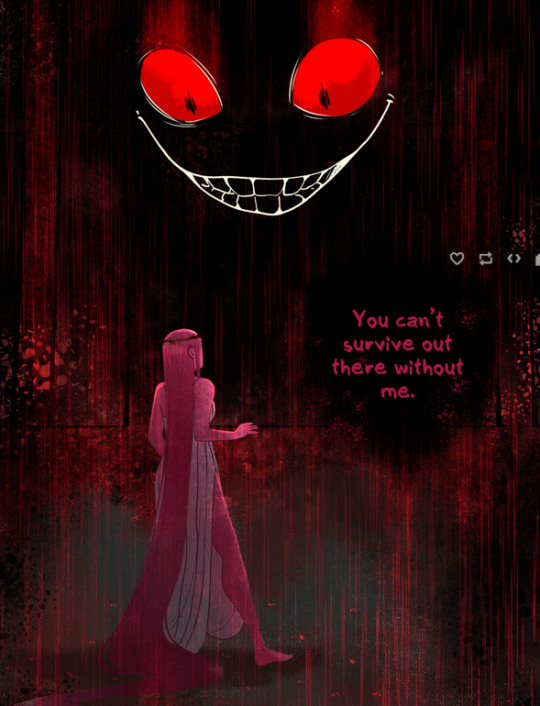
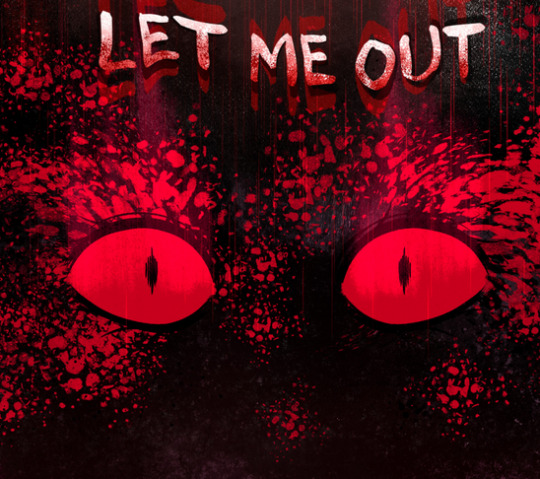
It's of persephone in a greenhouse her mother placed her in with this red eye thing following her from outside the greenhouse. I have no idea of this lurker if its her metaphorical rage or a danger in her life but either way, i am intrigued by its presentation.
The Characters
When reading lore rekindled and lore olympus, the characters are definetly an odd experience. For lore olympus, the characters arent exactly uh....great per say. I think the main reason for this is how their ultilised, with characters like eros, hera, hectate etc being there to mostly be a matchmaker for hades and persephone even if it was initially seen as wrong like with hera and hectate, be antagonistic as a way to have conflict between hades and persephone like minthe, demeter and recently leuce even if ones had reasons too like minthe with hades emotionally cheating on her and demeter because lets be honest, she had a point. Then there's hades and persephone, whoo boy where to start with them.
Hades starts off as a creep eyeing at persephone during a party, specifically at her body and still lusts persephone even being aware that shes 19 and he's 2000 years old. Also is a shitty boss, father AND contributes to slavery with it while being adressed in some way, doesnt change him which isnt good for a character that's meant to be the main protagonists love interest.
Persephone though, I can get the self insert vibes. From favouritism towards the story, being who most of the men in the story are attracted too, portrayed as a 'cinnamon roll' (they actually said that early on in the story, im not kidding) who cant do no wrong. She acts like a teenager rather than a young adult which makes the scenes where shes sexualised just more uncomfortable (and they already unnecessarily were) along with adding that uncomfortability to the romance
But with rekindled, they expanded on the characters much more than they originally were. Persephone for instance has turned from a 'sexy baby' legal teenager to an actual young relatable adult with agency and allows her to screw up (e.g, getting drunk on her own rather than eros drunking her). Her adult attitude makes the romance between her and hades not only more palpable, but also strays away from the infantilisation/uncomfortable sexualisation of her character which is nice to see. Hades also is written well in the series from how it acknowledges his faults while still making him likable. And thats the same for every character really, their personalities are much more fleshed out and nuanced which makes their characters feel real to life, gaining effectiveness for more emotional scenes with them. An interesting thing too is that they even expanded the magazine guy's character from making fake news for profit into feeling guilt over what they done, standing up for persephone which is a pretty nice change.
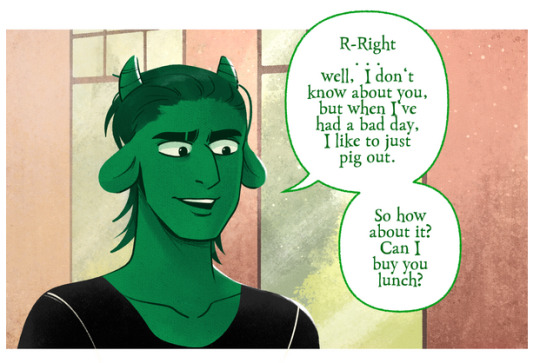
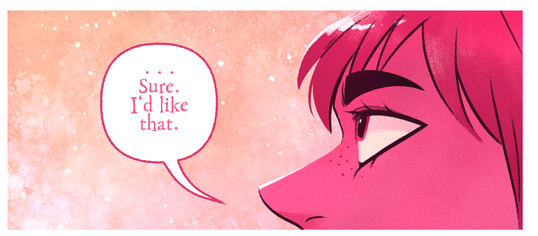
No Sa Plotline
Not like you cant have sa in your story ever but if you never planned it from the beginning and only did when people tell you that the scene you drew from your comic was sa then....maybe just not do it. Lore olympus does exactly that where while an attempt was made, it goes on to retcon it into making apollo (the guy who sa'd persephone) into a lesser evil like that would made a difference instead of just cutting it out from the very beginning. Lore rekindled thankfully just made apollo into his pilot version, a shitty bf but more likeable and expanded upon (which should have been his portrayal from day 1). His shittiness doesnt come up in the story, more like self absorbness/egotisticalness although with its recent chapter of the magazine guy offering persephone lunch, it might reveal some cracks or at least further down the story it will be revealed to us which futhers how effective rekindled character writing is in how its expansion of characters would give us the feels. That or portray him as not a good match for persephone, either way much better than the original.
Artstyle
Lore olympus has a pretty good artstyle (at least in s1/the early episodes, s3 is just kinda goofy) but lore rekindled has got a good artstyle which is on top, more consistent too. Here's some examples;
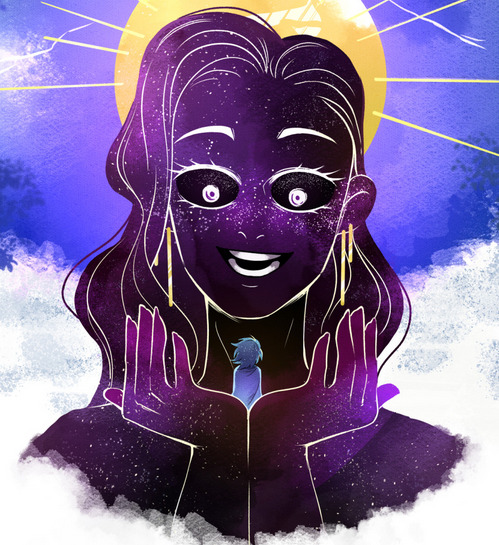
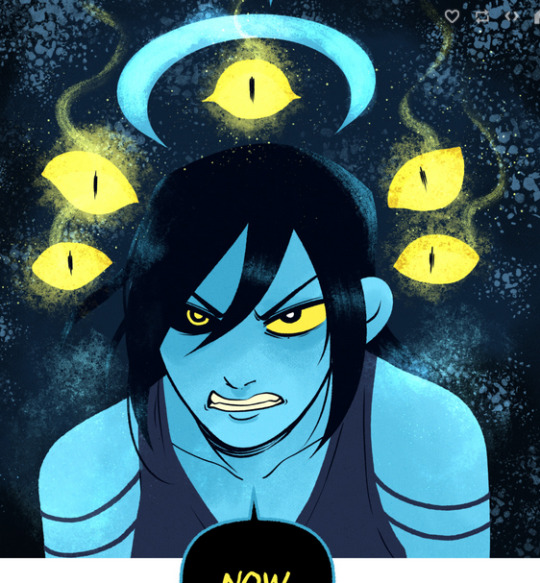

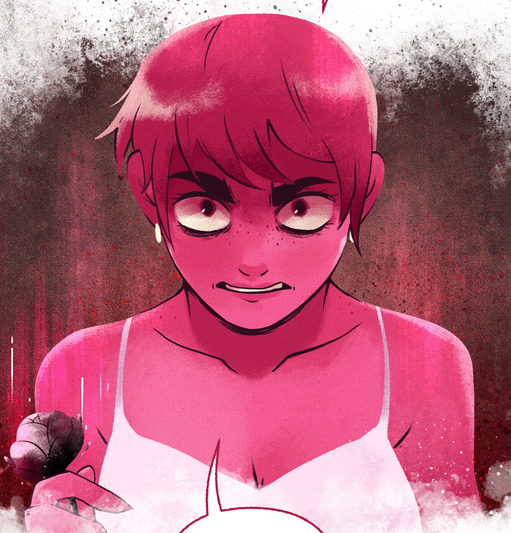
Comedy

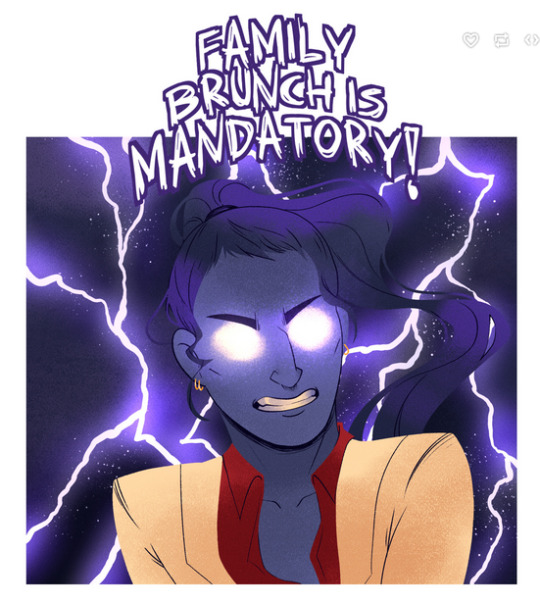


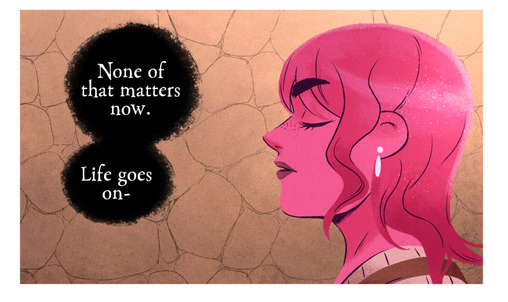

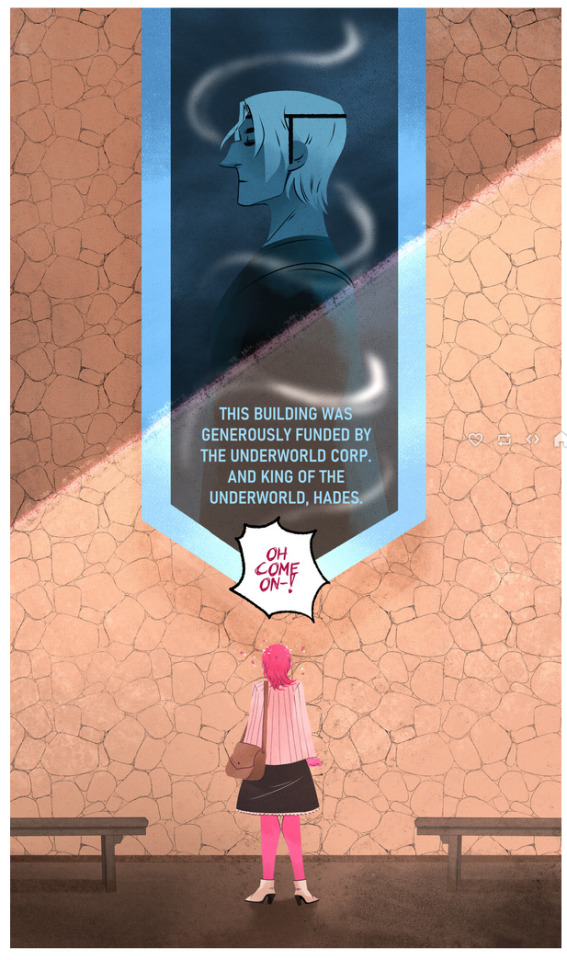
It's objectively funnier than lore olympus, no question asked
All in all, if you want to read lore olympus, i recommend you to read the lore rekindled one instead as it's better in every way. Give it a read.
#lore olympus critical#lo critical#anti lo#anti lore olympus#lore rekindled#generic puff#genericpuff
1K notes
·
View notes
Text
Hamlet’s Age
Not to bring up an age-old debate that doesn’t even matter, but I have been thinking recently how interesting Hamlet’s age is both in-text and as meta-text.
To summarize a whole lot of discussion, we basically only have the following clues as to Hamlet’s age:
Hamlet and Horatio are both college students at Wittenberg. In Early Modern/Late Renaissance Europe, noble boys typically began their university education at 14 and usually completed at their Bachelor’s degree by 18 or 19. However, they may have been studying for their Master’s degrees, which was typically awarded by age 25 at the latest. For reference, contemporary Kit Marlowe was a pretty late bloomer who received a bachelor’s degree at 20 and a master’s degree at 23.
Hamlet is AGGRESSIVELY described as a “youth” by many different characters - I believe more than any other male shakespeare character (other than 16yo Romeo). While usage could vary, Shakespeare tended to use “youth” to mean a man in his late teens/very early 20s (actually, he mostly uses it to describe beardless ‘men’ who are actually crossdressing women - likely literally played by young men in their late teens)
King Hamlet is old enough to be grey-haired, but Queen Gertrude is young enough to have additional children (or so Hamlet strongly implies)
Hamlet talks about plucking out the hairs of his beard, so he is old enough to at least theoretically have a beard
In the folio version, the gravedigger says he became a gravedigger the day of Hamlet’s birth, and that he’s be “sixteene here, man and boy, thirty years.” However, it’s unclear if “sixteene” means “sixteen” or “sexton” (ie has he worked here for 16 years but is 30 years old, or has he been sexton there for thirty years?)
Hamlet knew Yorick as a young child, and the gravedigger says Yorick was buried 23 years ago. However, the first quarto version version of Hamlet says “dozen years” instead of “three and twenty.” This suggests the line changed over time. (Or that the bad quarto sucks - I really need to make that post about it, huh…)
Yorick is a skull, and according to the gravedigger’s expertise, he has thus been dead for at least 7-8 years - implying Hamlet is at least ~15yo if he remembers Yorick from his childhood
One important thing sometimes overlooked - Claudius takes the throne at King Hamlet’s death, not Prince Hamlet. That is mostly a commentary on English and French monarchist politics at the time, but it is strange within the internal text. A thirty year old Hamlet presumably would have become the new monarch, not the married-in uncle (unless Gertrude is the vehicle through which the crown passes a la Mary I/Phillip II - certainly food for thought)
Honestly, Hamlet is SO aggressively described as being very young that I’m fairly confident the in-text intention is to have him be around 18-23yo. Placing his age at 30yo simply does not make much sense in the context of his descriptors, his narrative role, and his status as a university student.
However, it doesn’t really matter what the “right” answer is, because the confusion itself is what makes the gravedigger scene so interesting and metatextual. We can basically assume one of the following, given the folio text:
Hamlet really is meant to be 30yo, and that was supposed to surprise or imply something to the contemporary audience that is now lost to us
Older actors were playing Hamlet by the time the folio was written down, and the gravedigger’s description was an in-text justification of the seeming disconnect between age of actor and description of “youth”
Older actors were playing Hamlet by the time the folio was set down, and the gravedigger’s description was an in-text JOKE making fun of the fact that a 30-something year old is playing a high-school aged boy. This makes sense, as the gravedigger is a clown and Hamlet is a play that constantly pokes fun at its own tropes and breaks the fourth wall for its audience
The gravedigger cannot count or remember how old he is, and that’s the joke (this is the most common modern interpretation whenever the line isn’t otherwise played straight). If the clown was, for example, particularly old, those lines would be very funny
Any way you look at it, I believe something is echoing there. It seems like this is one of the many moments in Hamlet where you catch a glimpse of some contemporary in-joke about theater and theater culture* that we can only try to parse out from limited context 430 years later. And honestly, that’s so interesting and cool.
*(My other favorite example of this is when Hamlet asks Polonius about what it was like to play Julius Caesar in an exchange that pokes fun of Polonius’ actor a little. This is clearly an inside-joke directed at Globe regulars - the actor who played Polonius must have also played Julius Caesar in Shakespeare’s play, and been very well reviewed. Hamlet’s joke about Brutus also implies the actor who played Brutus is one of the main cast in Hamlet - possibly even the prince himself, depending on how the line is read).
#hamlet#hamlet meta#hamlet’s age#this obviously does NOT imply anything about being 30yo btw#any age is a good age to be driven to madness by guilt and grief#It’s just very unusual for shakespeare to describe somebody well past their apprentice age as a ‘youth’#and that makes those lines very interesting#shut up e#willy shakes#posting this while EXHAUSTED going to see a million errors and tone problems tomorrow sorry in advance yall#long post#posting Hamlet meta like it’s 2014 hell yeah
938 notes
·
View notes
Note
Now you got me thinking...I've been thinking about writing a fic where the (in-universe) desensitization of violence for the main characters is a running theme. My main issue, however, is managing the violence within said narrative because, as you've said before, violence has diminishing returns. While I don't want it to be a gorefest from start to finish, I do want part of the horror to be having to engage in it, no matter what steps are taken to avoid it. If I'm not careful, I could end up with a weaker story for all the violence in it. What could I do to maintain this theme without it losing its impact due to these diminishing returns?
So, there's two different things going on here, and ironically, it's the same term, and mostly the same process.
When I'm talking about your audience becoming desensitized to violence, it's more that they become acclimated to the degree of violence you're comfortable with exposing them to. Again, “diminishing returns,” because as you expose them to more violence, they become more acclimated to that violence, and the shock value will subside. Similarly, the ability to build tension on the threat of violence occurring falls off when you're willing to engage in violence, but that doesn't mean you can't build tension, just that you need to be a little more careful about establishing those stakes.
Also, when most people write violence, they tend to establish implicit boundaries. It may be that only certain characters engage in violence. It may that certain areas are exempted from violence. At very mechanical abstraction, with some writers, you can tell when they've introduced a location that is exempt from violence. Even if you're getting into diminishing returns, violating these kinds of boundaries can keep the violence fresher than you'd expect. The formula of slasher films put a lot of effort into maintaining shock value by creating misleading boundaries that you'll pick up on and then violating them in new and novel ways.
Outside of some genuinely stomach churning violence, you're not likely to permanently move the needle for your readers. You're not actually desensitizing them to violence; just your willingness to depict violence.
I feel like I need to make a clarification: Too much violence doesn't mean the story will be bad. Normally, I offer advice with the assumption that you'll want to manage and maintain as much shock value as you can from your violence. However, that's not the only valid approach. That said, too much violence can cause your readers to disconnect from the work, so that is a legitimate consideration. Also, this doesn't mean the story loses impact. Unless the violence is the story, which is a somewhat weird edge case, violence won't necessarily reduce the impact of the story as a whole.
The example of slasher films, earlier, really does illustrate what I mean when I'm saying that lots of violence (even gratuitous violence) isn't going to necessarily mean that a story will be bad. (Though, this could spiral into a much deeper argument about the artistic merits of that genre.) To some extent, your choice of genre already starts to prepare the audience for a more violent experience. You're preemptively trading shock value for a higher baseline.
The second thing is your character being desensitized to violence. While there is something to be said for getting your audience into your character's head space to the point that they accept it as their own, doing that with desensitization to violence is extraordinarily difficult. (And, really, it's a tricky route to go in general. In most cases, the audience will simply assign whatever dissatisfaction they have onto you or the work, rather than realizing you were being clever.)
So, how do you show someone is desensitized to violence, without trying to simultaneously traumatize your audience? You show the consequences of that desensitization. This can show up in a character's sense of humor, their overall outlook. They may be more clinical about violence, more casual about its consequences (at least, superficially.) They might have an incredibly dark sense of humor, which might not come up most of the time.
In a larger context, a character who has been desensitized to violence may come across as basically normal, outside of a narrow band where certain concepts don't bother them. This is especially true with a specific brand of military humor, where violence has been rendered mundane for the individual, and the people they interact with on a regular basis.
Now, audience desensitization to violence can create a very weird situation. Where an absence of violence is more unsettling. Not because they're worried about what could happen, but because they're waiting for it all hell to break loose. It's one thing to simply call it, “tension,” but it is a very distinct kind of anxiety you can invoke, if you're careful. In the opening of a story, when the genre is clearly established, I've seen this compared to the ratchets on a roller coaster's first ascent. Everyone knows what they're here for, everyone's here for the ride, click, click... and then the lights go out, and the screaming starts.
I'm trying to make it sound easy, but violence is one of the more challenging things to write. That doesn't mean it's impossible, and you don't need to sit down and carefully sketch out every detail before you get going. The biggest thing to be careful of are that you don't want to overuse it, but you have a lot of flexibility to tell the story you want with the amount of violence you need to communicate that story.
Though, it might take a few tries until you get a tone you're happy with.
-Starke
This blog is supported through Patreon. Patrons get access to new posts three days early, and direct access to us through Discord. If you’re already a Patron, thank you. If you’d like to support us, please consider becoming a Patron.
134 notes
·
View notes